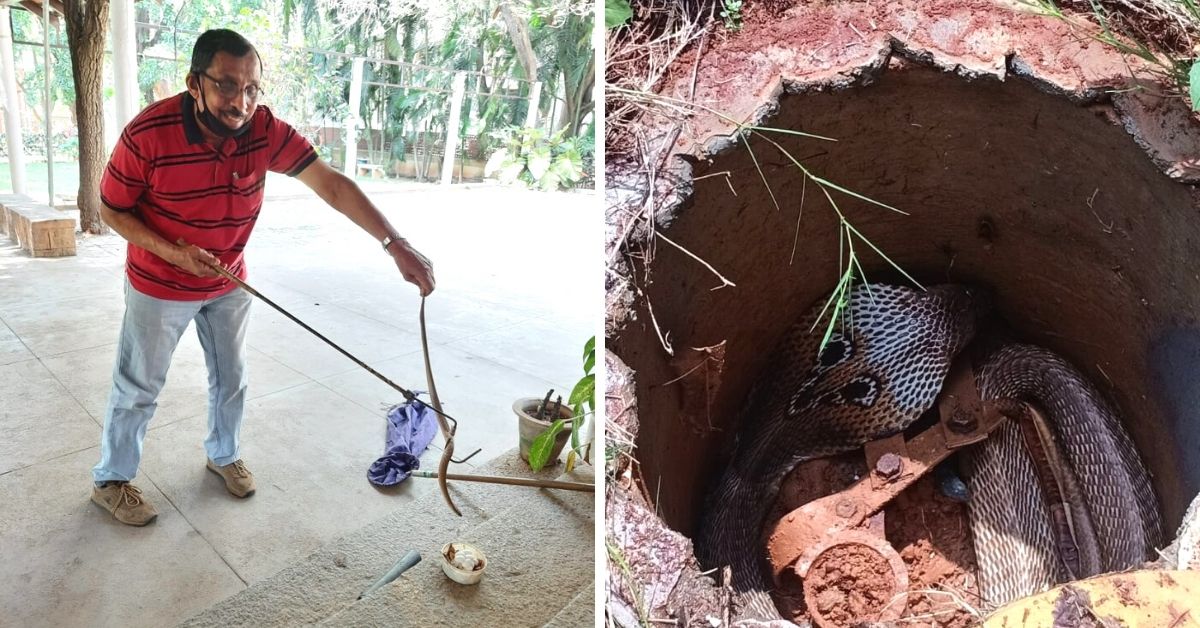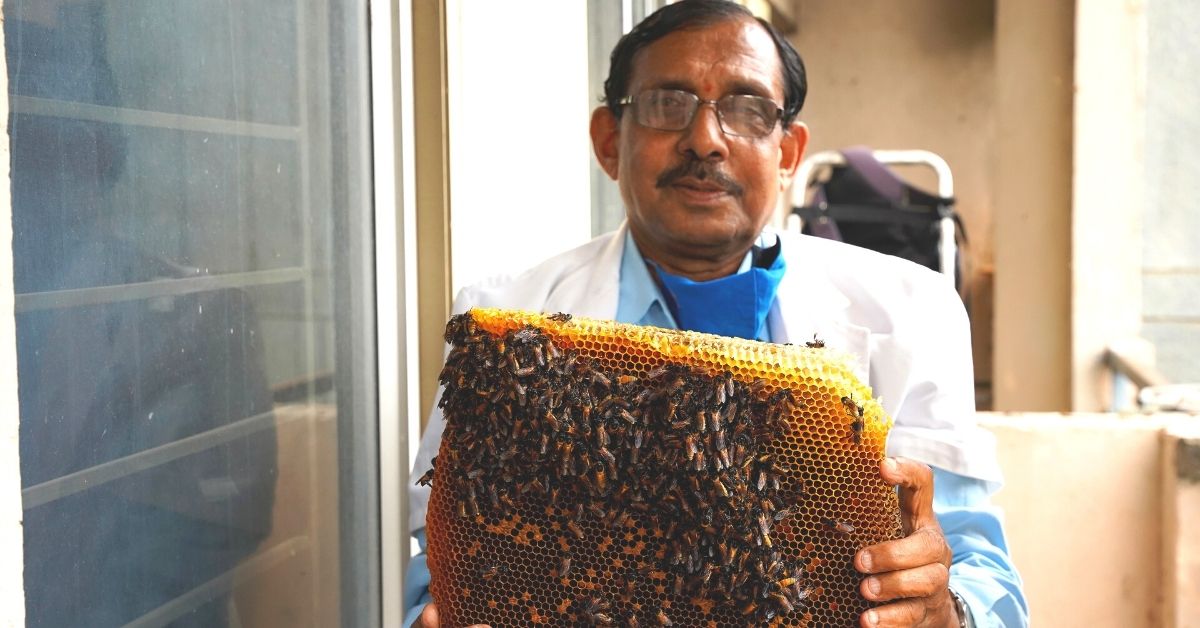Once A Security Guard at IISc, Coorg Man Has Mentored Research Students For 20 Years
K A Ponnanna from Karnataka joined IISc as a security guard, but began serving as a field assistant at the Centre for Ecological Sciences and helped mentor students in handling bees and collecting samples for research

K A Ponnanna, a native of Kodagu in Coorg, Karnataka, grew up amid peaceful co-existence with wild rabbits, lion-tailed macaques, deer, honey bees, wasps, and several other insects and animals.
He says these creatures were his pets. “The relationship between humans and wildlife was unique, as we reared and tended to wild animals and depended on them for livelihood,” he recalls.
Speaking with The Better India, Ponnanna (70) says that as he grew older, his job took him to places including Nashik, Hyderabad, Deolali, Dharangadhara and Jammu, where he served as a technician in the communications equipment field at the School of Artillery, a training institution of the Indian Army.
Ponnanna retired in 1993 and was appointed as a security guard with the Indian Institute of Science, Bengaluru. However, within a few days, his job profile took a different turn altogether.
The security guard became a field assistant and conservator of bees until he retired in 2018. Interestingly, despite the change in role, he continued his designation of a security guard and drew a salary for the same profile. He spent all his time at the Centre for Ecological Science (CES) department attending and mentoring students for their research work.
Here is his story.

Credits: KG Haridasan.
A few days into his job as security guard, Raghavendra Gadagkar, then associate professor at IISc, struck up a conversation with Ponnanna. “He had helped rescue a few beehives in the campus and I had heard about his enthusiasm and fearless attitude. I noticed that he was interested in honey bees. Our conversation helped me understand how he grew up tending to honey bees and wasps in his native village,” Raghavendra says.
He adds that considering the experience that Ponnanna had, he requested him to volunteer in the research. “The work involves spotting honey bees and safely handling the hive, collecting samples and even bees at times. It is a delicate process. And Ponnanna proved to be brilliant in all aspects,” he says.
He adds that he was impressed by Ponnanna’s skills and passion towards bees, and that he requested the security department to transfer Ponnana to the lab with the existing designation and salary.
“It is difficult to make such arrangements in a government institution. However, the administration was flexible and recognised the value Ponnanna held,” Raghavendra explains.
A friend, mentor and philosopher
Ponnanna says he was thrilled and thoroughly enjoyed every bit of the change in his profile.
“I had never attended any classes or received formal coaching on bee handling. I’d never worn clothes, gloves or held any equipment to handle bees. Moreover, I did not know the departments and their locations,” he says, modestly adding, “In my village, everyone handled bees and wildlife, and this was not unique to me.”
Ponnanna slowly got a hang of things as he worked in the lab, assisting students and researchers. “I can now differentiate between the types of bees, insects that are venomous and non-venomous, reptiles and other wild animals. I used the knowledge to help students in their research and accompany them during field visits to handle bees and wasps,” he adds.
The students accompanied him in batches and took help in collecting samples for their academic requirements.
Sujata Deshpande, an assistant professor at the Zoology department of Mumbai-based St Xavier’s College, was one of the PhD students who received help from Ponnanna.

“I was studying between 1999 and 2005, and he was more like a fatherly figure and mentor. He was always punctual and never hesitated to work late hours if needed. As students, we had to roam around a lot and search for wasps. But Ponnanna knew the most likely places that we’d find them, making our job easier. He handled bees like they were his children – with utmost care and protection,” she says.
Sujata says that hurting even one insect pained him. “The bee boxes in the campus would be safe and protected under his supervision. The chances of infections and diseases among the insects were also low because of the care he took,” she adds.
The academician says the field assistant’s traditional knowledge about bees helped students understand the insects and added value to their research.
Sujata says that over the years, Ponnanna’s role further evolved as a conservator. “The bees in Bengaluru suffered habitat losses in urban areas, and he often received calls for rescuing them. He would rush to the spot before anyone could destroy the beehives,” she adds.
Echoing her thoughts, Raghavendra says, “He has saved hundreds of beehives from destruction due to burning or spraying of pesticide and offered them a safe place inside the IISc campus. Many people wanted to get rid of the beehives around their residences, but he carefully removed them and resettled them without hurting any bees.”
He says that Ponnanna also became a friend, philosopher and guide to the students.
‘Have compassion for animals’
Raghavendra retired in 2012 and joined the institution as an honorary and Department of Science and Technology (DST ) year of science chair professor. Ponnanna retired around the same time and was reassigned as a consultant where he could continue to help students.

Apart from assisting researchers, Ponnanna also rescues snakes, other insects and animals.
Sharing his views on bee conservation, Ponnanna says that the destruction of habitat and beehives are contributors to adulteration in honey. “The use of pesticides in farms affects the bee population, and the insects often suffer from infection due to poor care. All these factors affect the population and honey production. To compensate, the companies adulterate the honey and sell it only because of its sweetness, but not for the medicinal properties the natural honey holds,” he says.
He adds that there needs to be a change in which the animals, insects and other biodiversity elements in nature are treated.
Ponnanna says that students should have a more practical approach and be willing to get their hands dirty in the research. “Apart from performing experiments in the lab, students should know how to handle what they are studying in the field. Only passion and sensitivity towards subjects can help achieve that,” he adds.
Citing an example, he says, “It is not difficult to catch an elephant when humans have managed to land on the moon. But we cannot hold the animal by the neck and choke it. We need to show compassion towards birds, insects, animals and other species. We should understand their anger, behaviour and other characteristics to ensure they are not harmed.”
Edited by Divya Sethu
If you found our stories insightful, informative, or even just enjoyable, we invite you to consider making a voluntary payment to support the work we do at The Better India. Your contribution helps us continue producing quality content that educates, inspires, and drives positive change.
Choose one of the payment options below for your contribution-
By paying for the stories you value, you directly contribute to sustaining our efforts focused on making a difference in the world. Together, let’s ensure that impactful stories continue to be told and shared, enriching lives and communities alike.
Thank you for your support. Here are some frequently asked questions you might find helpful to know why you are contributing?


This story made me
-
97
-
121
-
89
-
167











